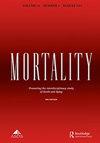预先护理计划的患者和家庭护理者视角:适应性尊重选择干预的ACTION集群随机对照试验的定性结果
IF 0.7
0 HUMANITIES, MULTIDISCIPLINARY
引用次数: 2
摘要
预先护理计划(ACP)被广泛认为是良好的临终关怀的一个组成部分。然而,一项关于患者和家庭照顾者对ACP的态度和偏好的定性国际研究的结果突出了参与者面对未来的矛盾心理,以及他们接受或推迟预期计划的动机因素。他们展示了ACP如何影响病人和他们的家庭照顾者之间的关系。尽管一些患者可能会欢迎参与ACP的机会,但治疗乐观主义或宿命论的倾向可能会限制其感知的吸引力或益处。将个人自主权作为ACP的伦理原则,与现实世界的背景并不相符。许多患者自然倾向于在他们所处的重要他人的网络中分担责任和决策,而不是行使不受约束的“选择”自由。本文章由计算机程序翻译,如有差异,请以英文原文为准。
Patient and family caregiver perspectives of Advance Care Planning: qualitative findings from the ACTION cluster randomised controlled trial of an adapted respecting choices intervention
Advance Care Planning (ACP) is widely regarded as a component of good end-of-life care. However, findings from a qualitative international study of patient and family caregiver attitudes and preferences regarding ACP highlight participants’ ambivalence towards confronting the future and the factors underlying their motivation to accept or defer anticipatory planning. They show how ACP impacts on, and can be determined by, relationships between patients and their family caregivers. Although some patients may welcome the chance to engage in ACP a tendency towards either therapeutic optimism or fatalism can limit its perceived appeal or benefit. The focus on individual autonomy as an ethical principle underlying ACP does not resonate with real world settings. Many patients naturally orient to share responsibility and decision making within the network of significant others in which they are embedded, rather than exert unfettered freedom of ‘choice’.
求助全文
通过发布文献求助,成功后即可免费获取论文全文。
去求助
来源期刊

Mortality
Arts and Humanities-Religious Studies
CiteScore
1.80
自引率
12.50%
发文量
42
期刊介绍:
A foremost international, interdisciplinary journal that has relevance both for academics and professionals concerned with human mortality. Mortality is essential reading for those in the field of death studies and in a range of disciplines, including anthropology, art, classics, history, literature, medicine, music, socio-legal studies, social policy, sociology, philosophy, psychology and religious studies. The journal is also of special interest and relevance for those professionally or voluntarily engaged in the health and caring professions, in bereavement counselling, the funeral industries, and in central and local government.
 求助内容:
求助内容: 应助结果提醒方式:
应助结果提醒方式:


